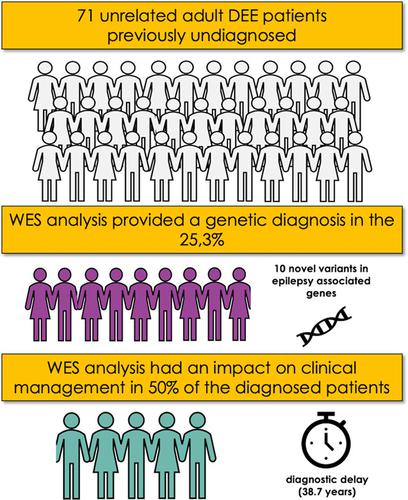当前位置:
X-MOL 学术
›
Clin. Genet.
›
论文详情
Our official English website, www.x-mol.net, welcomes your
feedback! (Note: you will need to create a separate account there.)
Whole-exome sequencing in adult patients with developmental and epileptic encephalopathy: It is never too late.
Clinical Genetics ( IF 2.9 ) Pub Date : 2020-07-29 , DOI: 10.1111/cge.13823 Raffaella Minardi 1 , Laura Licchetta 1, 2 , Maria Chiara Baroni 3 , Tommaso Pippucci 4 , Carlotta Stipa 1 , Barbara Mostacci 1 , Giulia Severi 4 , Francesco Toni 1 , Luca Bergonzini 3 , Valerio Carelli 1, 2 , Marco Seri 4 , Paolo Tinuper 1, 2 , Francesca Bisulli 1, 2
Clinical Genetics ( IF 2.9 ) Pub Date : 2020-07-29 , DOI: 10.1111/cge.13823 Raffaella Minardi 1 , Laura Licchetta 1, 2 , Maria Chiara Baroni 3 , Tommaso Pippucci 4 , Carlotta Stipa 1 , Barbara Mostacci 1 , Giulia Severi 4 , Francesco Toni 1 , Luca Bergonzini 3 , Valerio Carelli 1, 2 , Marco Seri 4 , Paolo Tinuper 1, 2 , Francesca Bisulli 1, 2
Affiliation

|
Developmental and epileptic encephalopathies (DEE) encompass rare, sporadic neurodevelopmental disorders and usually with pediatric onset. As these conditions are characterized by marked clinical and genetic heterogeneity, whole‐exome sequencing (WES) represents the strategy of choice for the molecular diagnosis. While its usefulness is well established in pediatric DEE cohorts, our study is aimed at assessing the WES feasibility in adult DEE patients who experienced a diagnostic odyssey prior to the advent of this technique. We analyzed exomes from 71 unrelated adult DEE patients, consecutively recruited from an Italian cohort for the EPI25 Project. All patients underwent accurate clinical and electrophysiological characterization. An overwhelming percentage (90.1%) had already undergone negative genetic testing. Variants were classified according to the American College of Medical Genetics and Genomics guidelines. WES disclosed 24 (likely) pathogenic variants among 18 patients in epilepsy‐related genes with either autosomal dominant, recessive or X‐linked inheritance. Ten of these were novel. We obtained a diagnostic yield of 25.3%, higher among patients with brain malformations, early‐onset epilepsy and dysmorphisms. Despite a median diagnostic delay of 38.7 years, WES analysis provided the long‐awaited diagnosis for 18 adult patients, which also had an impact on the clinical management of 50% of them.
中文翻译:

发育性和癫痫性脑病成年患者的全外显子组测序:永远不会太晚。
发育性和癫痫性脑病 (DEE) 包括罕见的散发性神经发育障碍,通常在儿童中发病。由于这些疾病具有显着的临床和遗传异质性,全外显子组测序(WES)代表了分子诊断的首选策略。虽然它的实用性在儿科 DEE 队列中得到了很好的证实,但我们的研究旨在评估 WES 在该技术出现之前经历过诊断奥德赛的成年 DEE 患者的可行性。我们分析了 71 名不相关的成年 DEE 患者的外显子组,这些患者是从 EPI25 项目的意大利队列中连续招募的。所有患者都接受了准确的临床和电生理表征。压倒性的百分比 (90.1%) 已经接受了阴性基因检测。根据美国医学遗传学和基因组学学院的指南对变体进行分类。WES 在 18 名具有常染色体显性遗传的癫痫相关基因的患者中披露了 24 个(可能的)致病变异、隐性或 X 连锁遗传。其中十个是新颖的。我们获得了 25.3% 的诊断率,在脑畸形、早发性癫痫和畸形患者中更高。尽管中位诊断延迟为 38.7 年,但 WES 分析为 18 名成年患者提供了期待已久的诊断,这也对其中 50% 的临床管理产生了影响。
更新日期:2020-07-29
中文翻译:

发育性和癫痫性脑病成年患者的全外显子组测序:永远不会太晚。
发育性和癫痫性脑病 (DEE) 包括罕见的散发性神经发育障碍,通常在儿童中发病。由于这些疾病具有显着的临床和遗传异质性,全外显子组测序(WES)代表了分子诊断的首选策略。虽然它的实用性在儿科 DEE 队列中得到了很好的证实,但我们的研究旨在评估 WES 在该技术出现之前经历过诊断奥德赛的成年 DEE 患者的可行性。我们分析了 71 名不相关的成年 DEE 患者的外显子组,这些患者是从 EPI25 项目的意大利队列中连续招募的。所有患者都接受了准确的临床和电生理表征。压倒性的百分比 (90.1%) 已经接受了阴性基因检测。根据美国医学遗传学和基因组学学院的指南对变体进行分类。WES 在 18 名具有常染色体显性遗传的癫痫相关基因的患者中披露了 24 个(可能的)致病变异、隐性或 X 连锁遗传。其中十个是新颖的。我们获得了 25.3% 的诊断率,在脑畸形、早发性癫痫和畸形患者中更高。尽管中位诊断延迟为 38.7 年,但 WES 分析为 18 名成年患者提供了期待已久的诊断,这也对其中 50% 的临床管理产生了影响。











































 京公网安备 11010802027423号
京公网安备 11010802027423号